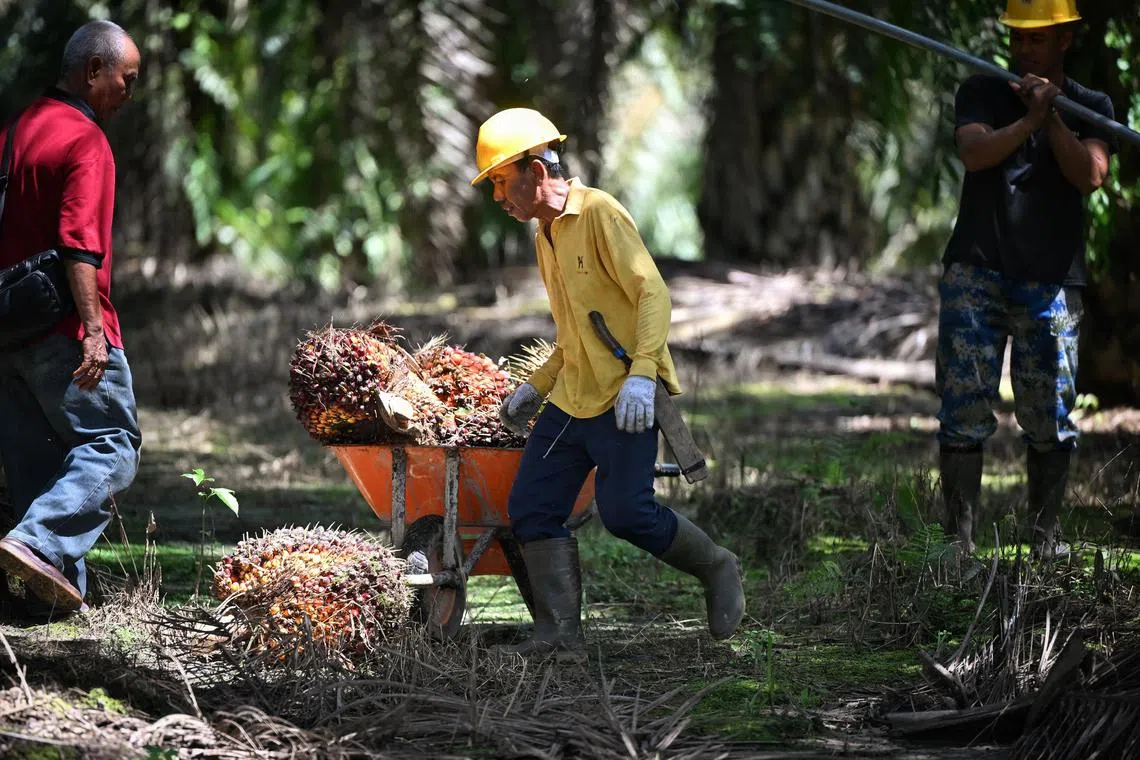Indonesia, Malaysia applaud EU’s proposal to delay anti-deforestation law by a year
Sign up now: Get insights on the biggest stories in Malaysia

Indonesia is the biggest producer of palm oil in the world, followed by Malaysia.
PHOTO: ST FILE
Follow topic:
JAKARTA – Indonesia and Malaysia, the world’s top palm oil producers, have welcomed the move by the European Union to delay the implementation of its anti-deforestation regulation by a year, even as climate activists deemed it a setback in environmental protection.
Adopted in 2023, the EU Deforestation Regulation (EUDR) has been lauded as a key milestone to address climate change by requiring exporters of agricultural commodities, including palm oil, and their derivative items to prove they are not produced on deforested land. The regulation was to start on Dec 30, 2024.
The proposed one-year extension will give producers and other industry players more time to comply with the bloc’s complex requirements. The proposal would need the approval of the European Parliament and member states, the European Commission said on Oct 2.
The new EU policy covers seven key commodities: palm oil, soya, beef, wood, cocoa, coffee and rubber, along with products made from them if derived from recently deforested land anywhere in the world.
The issues affecting palm oil will be closely watched
Indonesia is the biggest producer of palm oil in the world, followed by Malaysia, with the two countries accounting for about 85 per cent of the world’s exports. The global palm oil trade is valued at US$63 billion (S$82 billion) to US$70 billion annually, according to data from market research firms.
There are around 2.7 million small-scale farmers in Indonesia and 450,000 in Malaysia, who depend on the palm oil industry for their modest livelihoods. At the other end of the scale, top tycoons in the two countries control huge tracts of oil palm plantations.
Indonesia produced 47 million tonnes of palm oil between 2023 and 2024, while Malaysia had 20 million tonnes, according to the US Department of Agriculture. The third-largest palm oil producer in the world, Thailand, produced just 3.3 million tonnes in the same period.
Environmentalists are up in arms over the possible delay in implementing the new EU rule, seeing it as a blow to efforts to slow down climate change and biodiversity loss from deforestation.
On the flipside, the Indonesian Palm Oil Association (Gapki) said that the one-year extension was “reasonable” and would prevent disruption of exports as both producing nations and the EU systems are not ready.
“If the regulation were to be implemented in December (2024), there will be disruption in exports to the EU. Not only exporters, but importers are also not ready,” Gapki’s board member, Dr Fadhil Hasan, told The Straits Times.
He added: “The requirements are too complex, especially for smallholders, and it takes a long time to get prepared.”
The Malaysian Palm Oil Council (MPOC), meanwhile, called the delay the “right decision” and echoed Gapki’s view on the lack of readiness on both sides to carry out the new rule.
“This is a victory for common sense, and a welcome relief for all of those businesses which highlighted the need for a delay,” MPOC chief Belvinder Kaur Sron said in a statement.
“Malaysia has over the past two years consistently provided evidence to the EU authorities that the implementation date of Dec 30, 2024, was unworkable, and the EU systems were not ready,” she added.
Dr Fadhil expects the EU and palm oil-producing nations to tackle several pending issues during the extension period, such as data protection regarding the required geolocation data.
The Indonesian and Malaysian authorities also welcomed the delay.
“With the one-year delay, they show their goodwill by listening to aspirations from producing countries,” the Deputy Minister for Food and Agribusiness at Indonesia’s Coordinating Ministry for Economic Affairs, Mr Dida Gardera, was quoted as saying by Antara news agency, referring to the 27-member EU bloc.
Malaysia’s Deputy Minister of Plantation and Commodities, Datuk Chan Foong Hin, said that his government is working on initiatives to build the capacity of its smallholders to comply with the new rule.
“Malaysia strongly advocates for the EU to recognise our Malaysian Sustainable Palm Oil as one of the standards validating sustainable agricultural requirements under the EUDR regulation,” he added.
Despite the delay, small-scale farmers still have concerns.
Mr Gulat Manurung, chairman of the Indonesian Oil Palm Farmers Association (Apkasindo), which represents small-scale farmers, told ST that the requirements to export set by the EU, such as traceability of where the palm oil was harvested, were “tough to meet”.
“While it pays attention to environmental sustainability, it also needs to accommodate the economic and social sustainability affecting farmers,” he said, adding that he hoped the EU would review the plan to implement the regulation.
But environmentalists opposed the EU’s plan to delay implementing the regulation, questioning its commitment to stem deforestation.
Ms Uli Arta Siagian, forest and plantation campaign manager at the Indonesian Forum for the Environment (Walhi), said the delay may hinder necessary reforms in Indonesia’s palm oil industry.
“The one-year delay will make issues like deforestation and land disputes in Indonesia more complicated. If the EUDR came into force as scheduled, the Indonesian government would have to bring in reforms to address the problems immediately,” she told ST. She was referring to tensions between rural land owners and plantation companies expanding into forested land, which would likely continue in the event of a delay.
“The delay is a setback to the EU’s own commitment,” she said.


